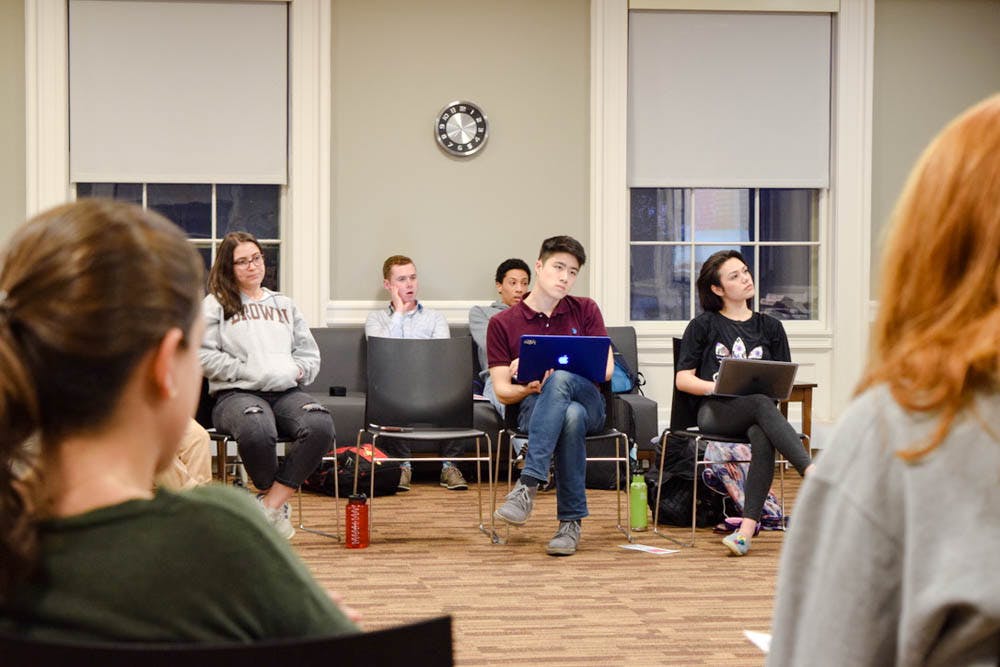At their Wednesday evening general body meeting, the Undergraduate Council of Students heard a presentation from SHARE and received information about recommended changes to the Code of Student Conduct.
The Code of Student Conduct was last reviewed four years ago and must undergo a review every five years. Recommended changes for the fall include incorporating a restorative justice approach to conduct-breach hearings, adding new prohibited behaviors, revising the language of the code, adjusting procedures for student groups and adding the right to appeals for specific cases.
The Office of Student Conduct and Community Standards’ core values include fairness, transparency and being socially just. “The vision was, if we have no code at all, what would it look like if we built a code up around those core values,” said Kirsten Wolfe, associate dean of students and assistant director of student conduct and community standards. “Instead of saying, ‘let’s tweak this,’ (we said) ‘let’s start from the ground up.’”
An 18-person committee comprised of students, faculty and staff from the OSCCS, the Office of Institutional Equity and Diversity and the Office of Residential Life drafted the new code procedures, Wolfe said. The committee plans to continue revising the draft before submitting the recommendations for a Corporation vote in May. In addition to Wolfe’s presentation to UCS, Senior Associate Dean and Director of Student Conduct and Community Standards Yolanda Castillo-Appollonio discussed the proposed changes to the code with the Graduate Student Council last night.
“The biggest recommendation that the committee is making is that we adopt a restorative approach to the work that we’re doing,” Wolfe said, though the new approach would not replace traditional methods, which tend to be punitive. “It’s going to add some growth and learning opportunities for a student that don’t happen naturally out of the traditional hearing process,” she added.
The traditional approach to disciplinary hearings focuses on determining what rule or law was broken, who broke the rule and what the offender deserves as a consequence. “What a restorative approach asks instead is what harm was caused, what are those harmed parties’ needs and whose obligation is it to meet those needs,” Wolfe said.
In this restorative approach, respondents would have to take responsibility “at the outset” and express “some measure of willingness to make a repair and engage in that sort of process,” Wolfe said. The process would allow respondents to work with complainants to craft the outcome of the hearing and make amends, in addition to allowing harmed groups to name how they were harmed and the needs they have moving forward, she added.
The committee hopes that the new process will encourage more reports of instances of harm when groups or individuals “want somebody held accountable for hurting them, but they don’t necessarily want them punished,” Wolfe said.
The recommended changes also include adding seven new behaviors that should be considered a violation of community standards, including participation in derecognized organizations and the disruption of safety.
Derecognized organizations refer to student groups such as athletic teams and fraternities that have been expelled or suspended from the University but are “trying to continue their presence on campus in an underground way,” Wolfe said. “Groups that lose their recognition aren’t any longer under University oversight,” leading to concerns of hazing behaviors occurring within these groups, she added.
Acts such as tampering with fire or safety equipment would become prohibited with the addition of the disruption of safety as a banned behavior.
Other recommended changes include requiring the University to publish the statuses of all student groups “that are not in good conduct standing on campus” and implementing an appeals process for complainants in cases of harassment and physical or emotional harm, according to a sheet Wolfe distributed at the meeting.
SHARE Advocates Alana Sacks and Elliot Ruggles also presented at the meeting.
After incidents of harm relating to sexual violence, domestic violence or any interpersonal harm, “the support that someone seeks is usually from someone that they know,” Sacks said. Knowing how to respond to such incidents is important “not just for yourself, but also because you may be in a position where someone actually discloses their experience to you, and you can give people information about resources that are available.”
SHARE Advocates carry out harm prevention work and offer confidential services that include helping individuals file complaints and navigate resources at the University and in the community along with providing emotional support, such as by accompanying students to the hospital or legal appointments.
“We have a philosophical frame that we take into all of our work,” Sacks said. “There is a spectrum of experience that people may have,” but what incidents of interpersonal harm have in common is “a lack of consent or that they’re unwanted.”
SHARE’s advocacy-based counseling services are “based on the determination that someone has about what’s right for themselves, which is markedly different from psychotherapy, where someone might determine it for you” through diagnosis-based courses of treatment that don’t always “meet the person where they’re at,” Sacks said.
In the presentation, Ruggles also mentioned the Association of American Universities’ follow-up Climate Survey on Sexual Assault and Misconduct, which will open tomorrow.
At the start of the meeting, Chair of Academic Affairs Sofia Jimenez ’21 announced that nominations are open for the inaugural Exceptional Peer Advising Awards, through which the Office of the Dean of the College will award $500 to three undergraduate students.





